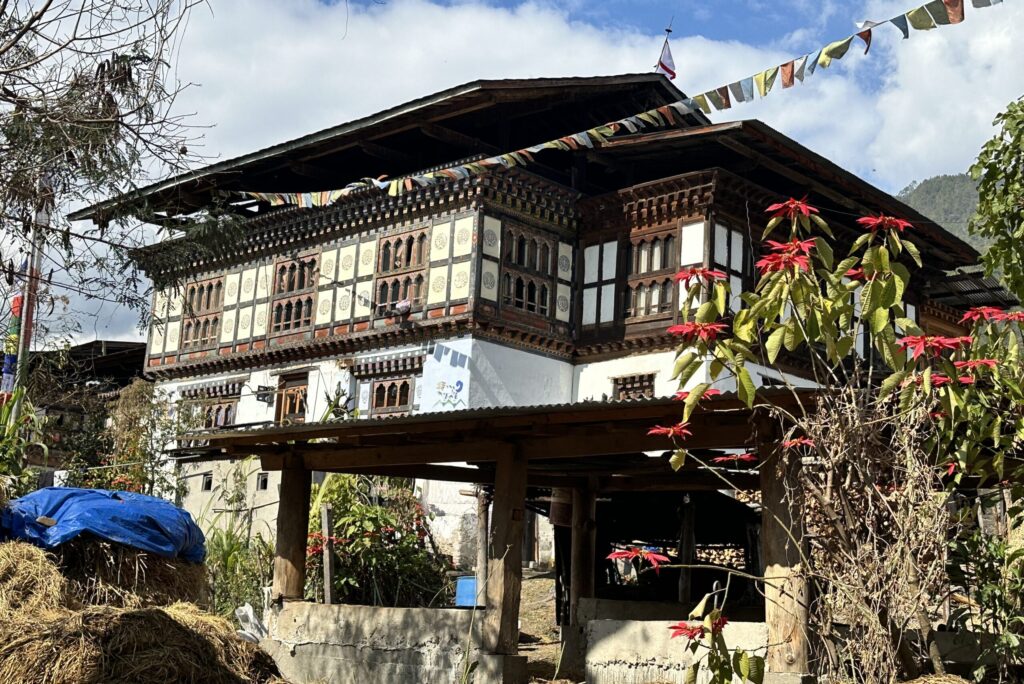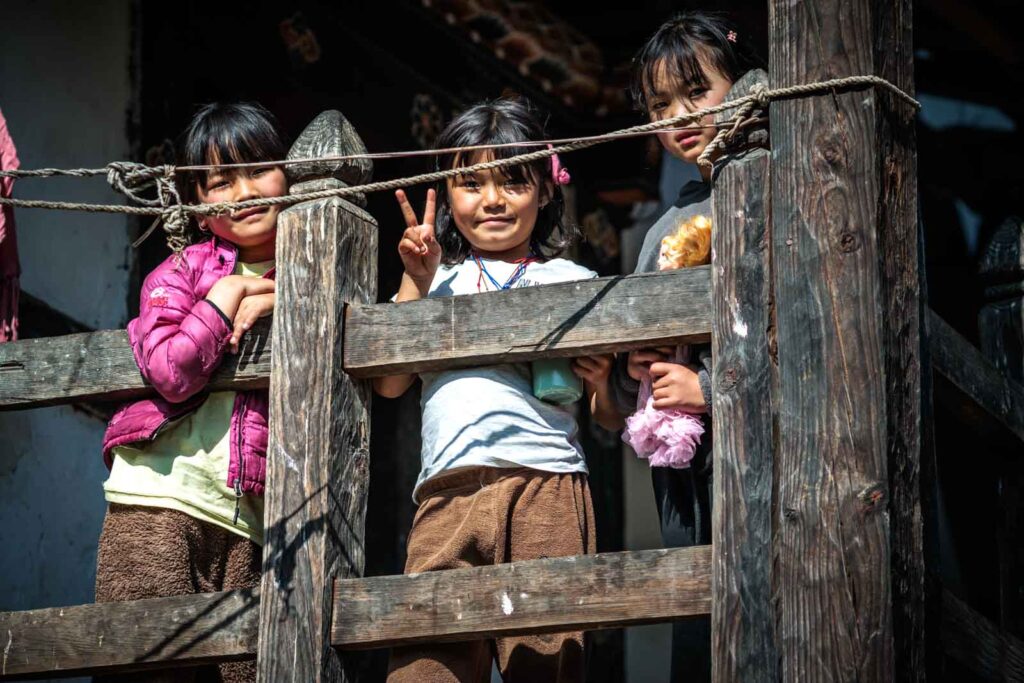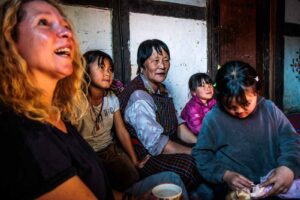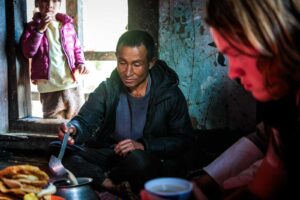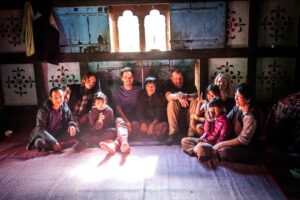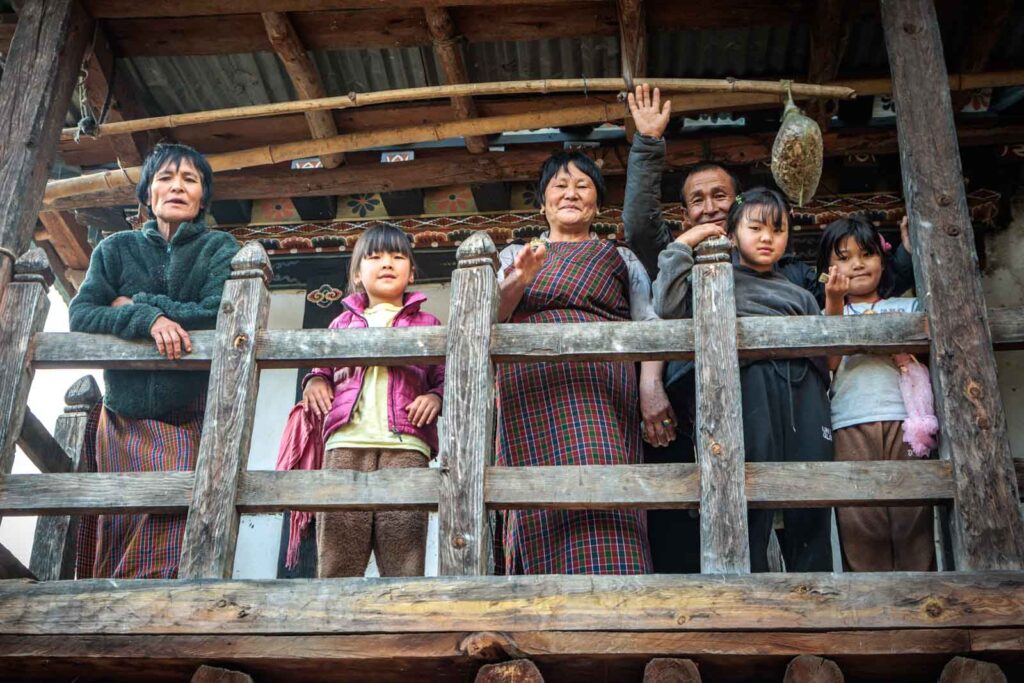Bhutan
Feeling blessed at a home visit in Bhutan
It’s the children we notice first.
Sitting on a balcony outside a house in a tiny village in the mountains in Bhutan. Sitting at the top of a steep set of steps that look more like a ladder than a staircase.
They’re sitting in a circle on the timber floor playing a game of make believe or telling each other stories. But then they sense our presence. All three girls look up, they smile and wave over the banister to us. Big smiles stretch across their faces at the novelty of seeing someone new in town.
We point to our cameras, our phones, asking if it’s ok to take photos of them.
They smile shyly.
Wave again.
When a lady steps out of the house, coming to stand next to the girls, we feel embarrassed, shy that we have been watching her children. Guilty that we’ve stood so long in front of her house. Guilty too that we’ve been taking photos of this building on the edge of town.
This random building, that of course is someone’s home.
Her home.
She chats to Nguyen, our guide, in Bhutanese.
We wait, in silence, looking from one face to the other, wondering what she is saying to him. Hoping we haven’t offended.
She’s inviting us in, Ugyen says.
She wants to know if you want to go inside for a drink.
We smile, and nod in excitement. We climb those rickety stairs and take off our shoes, stepping inside a large sunlit room.
A single cupboard sits along one wall and a red and blue checked rug lines the floor. Between timber panels, green and red shapes form patterns on white-washed walls.
The children, who were playing on the balcony join us inside now, watching us surreptitiously beneath long eyelashes. One of the girls holds a blonde Barbie doll dressed in a frilly soft pink skirt.
She takes me back to my own childhood and the tub of Barbie Dolls that filled my days. She runs her fingers through the doll’s hair and I think how out of place this doll is, here, in the mountains of Bhutan. And how little girls the world over have been seduced by Barbie.
Four of us sit in a row on the floor leaning against a wall. We sit under a window through which the sunlight streams in. Opposite us a pile of coloured suitcases sits next to a brightly painted chest. It is the only furniture in the room.
We sit alongside our guide, who breaks the silence by interpreting for us and helping us to navigate the local customs and etiquette.
He chats easily with the lady who owns the house. The lady who opened her home to us.
She is the grandmother of the three girls, two are sisters, one is a cousin, she tells us through our guide. They are staying for a few nights over the school holidays.
Suddenly there is a shadow in the doorway. A man wearing a big smile fills the frame. It’s her husband. He was in the field with his cattle when he heard he had guests at home so he came running.
It’s good luck, they say, to welcome strangers into your home, especially at harvest time, like it is now.
They pour us rice wine. It’s strong, stronger than anything we’ve drunk at home. And we drink it from a bowl.
You have to have three drinks, says our guide.
I look at him with a smile, assuming he must be joking. If I drink three bowls of this I’ll fall down the staircase outside.
They’ll just fill it up, he tells me, you don’t have to empty the bowl but let them fill it three times.
As we drink the wine and learn more about their life and who lives here the wife brings out a big bag of biscuits and an even bigger bag of chips for us to try. Local food. We don’t want to impose, don’t want to eat their food. But we also don’t want to offend.
Once again we look to our guide, who assures us they believe it is good luck to welcome a stranger. It is good luck for them to entertain us in their home, to share their food and wine with us.
We eat, not wanting to offend or to rebuff their kindness. It is we who feel blessed and humbled to be invited into their home. To be treated with such kindness.
We take out our cameras once again and take more photographs. This time our photos are posed. This time we take selfies – photos of us all together.
We are trying to capture everything about this moment in a stranger’s home in a part of the world so far away from our own, in a part of the world few people will venture into.
And once again I’m reminded that those who have few possessions are often the most giving, are often the first to share what they do have.
Reminded too of how little we actually need to live and to be happy.
Read more about our adventures in Asia here.
Fast Facts
We travelled in 2024.
We travelled with Druk Asia
We were in Bhutan for eight days.
Was it long enough? There was still more to see and we could easily have spent more time there, but we never felt rushed.
Highlights: This home visit was an impromptu stop along the way. One of those moments you can’t plan but that are always our favourite parts of travel. It is hard to fathom a country that is so relaxed and peaceful.
Join @AllabroadAU on Instagram, Facebook, X and YouTube for more travel inspiration.
